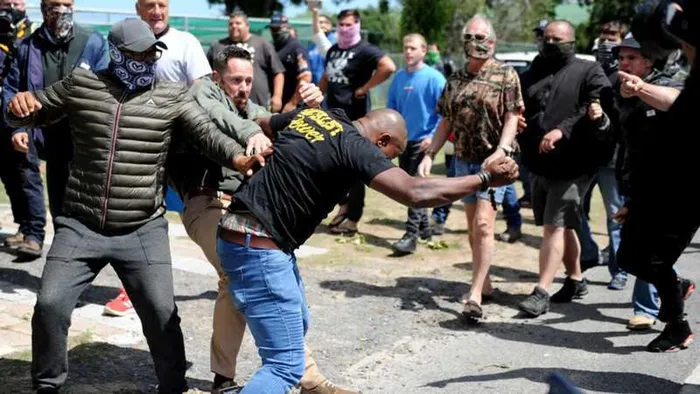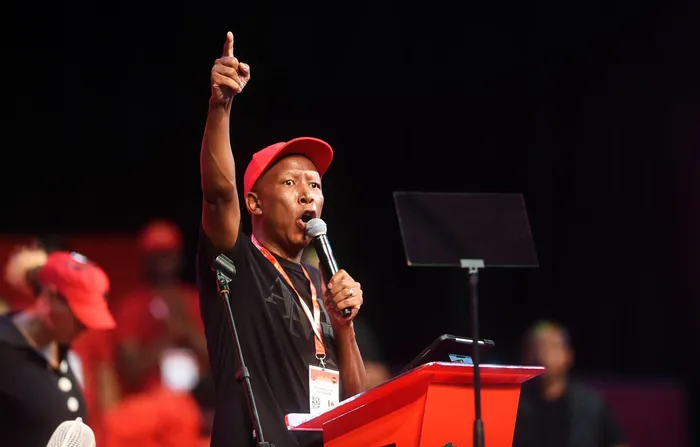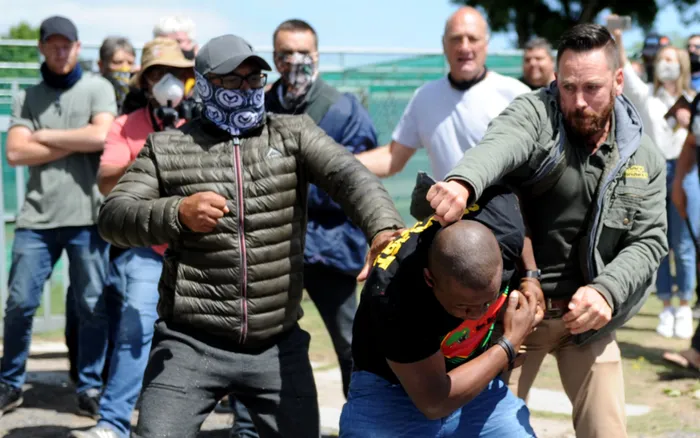
Fighting broke out between EFF and Brackenfell residents after a hostile stand-off at Brackenfell High School in 2020.
Image: Ayanda Ndamane / Independent Newspapers
The Equality Court has ruled that remarks made by EFF President Julius Malema in relation to an incident at Brackenfell High School constituted hate speech, and it demonstrated a clear intention to incite harm and promote or propagate hatred.
The ruling was made in the Equality Court earlier on Wednesday.
Attempts to get comments from the EFF in response to the judgment were unanswered.
The remarks referred to were made by Malema during the EFF’s 3rd Provincial Peoples Assembly, which was held in the Western Cape on October 16, 2022.
The court found that the statements constituted an exhortation to kill white males who had participated in an incident on November 9, 2020, at the Brackenfell High School during which EFF members were involved in a violent confrontation between members of a residents’ group and the police.
The catalyst for the confrontation was that a matric dance was cancelled in 2020 due to the Covid-19 pandemic. It was alleged that the parents of one of the children arranged for the function to be held at a wine farm, and invitations were sent to staff and pupils.
However, the father of one of the pupils alleged in a YouTube video that the event was held for white scholars only.

Economic Freedom Fighters (EFF) president Julius Malema at the closing address of the 3rd National People's Assembly at the Nasrec Expo Centre.
Image: Itumeleng English / Independent Newspapers
As a result of these allegations and other social media posts, EFF members held a protest at the school, as they considered this to be an instance of racist behaviour.
In an excerpt from Malema’s nearly two-hour speech in 2022, he had said: “You went to a school here to protest the other time, and you were beaten by white people, and there is a white man who is visible on camera. If I were to ask you, what have you done in terms of follow-up, after being beaten by that white guy, why have you not, as a revolutionary organisation, followed up on that guy, him alone, to check that guy in an isolated space and attend to the guy properly? What type of revolutionaries get beaten, and they don’t have a follow-up?
“Tell that white man to try me. I’ll come many times here in the Western Cape, appearing (in) a court case, because no white man is going to beat me up and (I) call myself a revolutionary the following day. You must never be scared to kill. A revolution demands that at some point, there must be killing because the killing is part of a revolutionary act […] Why are you scared? That anything that stands in the way of the revolution, it must be eliminated in the best interest of the revolution, and we must never be scared to do that,” Malema had said.

Protesting EFF supporters were attacked by a group of people against their stance outside Brackenfell High School.
Image: Picture: Ayanda Ndamane / Independent Newspapers
Following this, the matter was reported to the South African Human Rights Commission, which, litigated alongside Dante van Wyk who was identified as the man who was the subject of threats contained in the statements.
He and his life partner had been inundated with thousands of messages on social media emanating from EFF supporters, many of which were of an aggressive and threatening nature. As a result, he had gone into hiding in the Northern Cape.
On Wednesday, Equality Court Judge Mark Sher said the remarks made by Malema were found to violate the Equality Act, constituting hate speech, contrary to the provisions of Section 10, as they demonstrated a clear intention to incite harm and to promote or propagate hatred.
He said a declaratory order to this effect must be issued.
In reaction to the ruling, DA leader John Steenhuisen said the outcome is a victory for the rule of law, for the Constitution, and for all South Africans who cherish the values of a free, fair, and non-racial society.
“For too long, the world has watched as Julius Malema has incited violence, hatred, and division, attempting to unstitch the very fabric of South African society. His hate speech was most recently aired live from the White House in a meeting between President Donald Trump, President Cyril Ramaphosa, and a South African delegation.
“This type of divisive language is not just damaging on a local level; it has international repercussions as well. South Africa’s reputation on the global stage is at risk when such hatred is condoned or ignored,” said Steenhuisen.
Steenhuisen further said they would explore further action that can be taken to enforce serious consequences against the hate speech.
“South Africa’s Constitution protects freedom of expression, but it draws a clear line where speech incites hatred, discrimination, or violence. Julius Malema has repeatedly crossed that line. A political leader who incites mass murder is not normal, nor permissible.”
Public relations head at AfriForum, Ernst van Zyl, said the judgment confirms and underscores “what most already know: Julius Malema and the EFF are extremists that incite violence against minorities and spread a message of racial hatred”.
“It is outrageous that the president of South Africa invited Malema to rejoin the ANC in 2018 and continues to treat him with kid gloves.
“This judgment, alongside the UK government refusing Malema a visa due to his violent, extremist rhetoric, as well as the US State Department sounding the alarm over the EFF’s incitement of violence against minority groups, casts a shameful shadow on (president Cyril) Ramaphosa and the ANC’s continued refusal to condemn Malema and 'Kill the Boer' in no uncertain terms,” said Van Zyl.
Reflecting on the excerpt from the speech by Malema, Judge Sher said members were “adjured to ‘follow up’ on ‘the racist’ who had beaten them, as racism was violence and violence could only be ended by violence, not any other ‘necessary means’: a racist was a violent person and should therefore be treated as such”.
“Once again, they were clearly being told that violent retribution should be exacted for what had been done to them. This was no figure of speech but a clear instruction,” said Judge Sher.
Defending the remarks made, in their supplementary answering affidavit, Malema and the EFF as respondents said the SAHRC and Van Wyk had “cherry-picked” isolated statements from the speech, which were “taken out of context”.
Their arguments further stated that it was “ignorant” of the SAHRC to take the speech literally and its interpretation was that of an unreasonable, uninformed person who disregarded the context and history of SA.
“The speech was a nuanced, political one made at a political event, in the exercise of the 1st respondent’s (Malema) right to freedom of expression, which was fundamental to a democratic society, and was not hate speech, which constituted the incitement of violence or hatred against white people,” the respondents submitted.
Judge Sher said: “To call someone a racist in South Africa is, given our racially oppressive past, inevitably to invoke detestation, enmity, ill-will, and malevolence against such a person.
“While calling out someone who behaves as a racist may be acceptable, calling for them to be killed is not. And calling for someone to be killed because they are a racist who has acted violently is an act of vigilantism and an incitement of the most extreme form of harm possible.
“It is not acceptable in our society, which, in terms of the noble aims set out in the Equality Act, is trying to heal from a racially oppressive and violent past and to encourage and foster reconciliation, social cohesion, and goodwill amongst all races.
“When such a call emanates from the leader of the then 3rd (now 4th) largest political party in the country, it has the potential to foment racial violence on a large scale.
“There are several lawful options and remedies available in our law to deal with racists, including the remedies and procedures provided for in the Equality Act and, if warranted, the criminal law,” said Judge Sher.
chevon.booysen@inl.co.za
Related Topics: